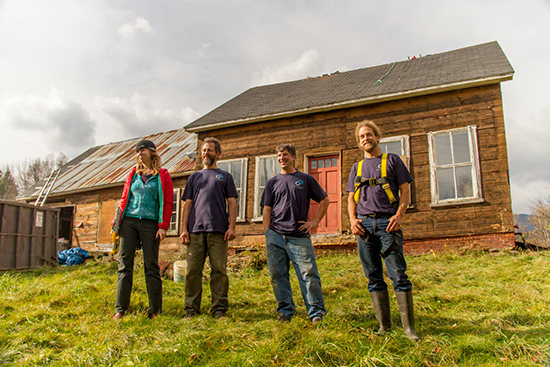
In an effort to revitalize the Tenney property on Marble Hill Road in Fayston as a working farm and forest in the Mad River Valley, Vermont Land Trust has contracted with Deconstruction Works to remove one of two farmhouses located on the property. Deconstruction Works is a team of deconstructionists specializing in the salvage and repurposing of the built environment. The team will carefully dismantle, salvage and repurpose components of the red farmhouse located at the top of Marble Hill Road. This undertaking is driven by the significant disrepair of the building and the financial burden that would be transferred to the next farm owner if it were left on the site.
"We believe this step will allow the next owners to focus their investment on the restoration of the farm's other historic buildings and the agricultural potential of the land," said Liza Walker, Mad River Valley director for the Vermont Land Trust. "Still, we were pleased to find an option for a thoughtful and 'green' deconstruction process that will maximize the reuse of the farmhouse's historic materials."
Skip and Peggy Tenney donated their 283-acre farm to Vermont Land Trust in December 2013 to enable the farm's perpetual conservation and contribution to The Valley's working landscape. Through its Farmland Access Program and in collaboration with the Mad River Watershed Conservation Partnership, the land trust is currently leading a process to select qualified farmers to renew the productive use of the farmland and forest and provide for community recreational opportunities on the land. Vermont Land Trust expects to sell the conserved farm to the selected buyer in 2015. The price of the farm, at its conserved value, will be $225,000.
The farm will be sold with the Tenney property's remaining farmhouse and barns and will be subject to a perpetual conservation easement and recreational trail easements coordinated with Catamount Trail Association, Mad River Riders and Mad River Path Association.
The red clapboard farmhouse, sited in a small meadow at the top of Marble Hill Road, reflects the property's history as a "hill farm." The house is the only remaining structure from the farm's homestead, which once included a barn and silo, henhouse and sugarhouse. The farm's history of diversified agricultural use is illuminated by a 1919 deed which included the following items with the farm's conveyance: "one pair horses, seven cows, one brood sow, 12 hens, one rooster, mowing machine, spring tooth harrow, cultivator, cream separator, churn, dairy tools, farm wagon, bob sled, sleigh and four bushes of beans."
The farm's history is especially vivid to Mad River Valley resident Richard Migneault, who moved to the upper Marble Hill farm with his family in in the early 1950s to help his aunt, Olive Barnes, run the farm. At the time, the farm included 7 milking cows and up to 3,000 chickens. The farming was done with a team of horses and, later, a military jeep. "It was a very hard life," Migneault remembers. "Every morning we would candle the eggs and bring about 1,000 of them with the cream to the bottom of the road, hoping they wouldn't freeze before they were picked up." He recalls living in the red house and sharing the second floor bedrooms with 12 siblings and cousins. "The girls slept on one side, the boys on the other. It was cold."
Migneault's family left the farm after a few years, but he returned to Marble Hill in the summers to help the Marble family on their adjoining dairy farm. The two family farms were purchased by Skip Tenney in 1959 and 1960, forming the larger 283-acre farm property now held by Vermont Land Trust.
As early winter temperatures move into The Valley, Deconstruction Works will continue their multi-week effort to remove the structure. For more general information about the Tenney Farm Conservation Project, contact Liza Walker, Mad River Valley director for the Vermont Land Trust, at 496-3690 or
{loadnavigation}





